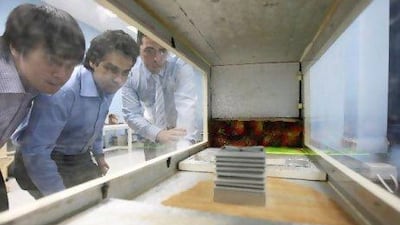DUBAI // For a house in the desert, the last thing one wants is open windows to let in sand. So other ways need to be found to let the air in - especially during the Gulf's sweltering summers.
For generations, wind towers were the answer. Usually positioned on one corner of a house, they were made of stone, mud brick or gypsum plaster, and stood around three to five metres above the roof, with vents facing in the direction of the sea, to catch the cooler air.
Just like an open window, the tower catches the air, which then filters down into the living area below, creating a cool air stream.
They came into use sometime after 1850, in settlements such as Bastikiya, a Persian trading port in Dubai. Often, the towers were wrapped in wet fabric, to increase their cooling power.
They did not work so well everywhere, though. In low settlements, there would be little, if any, air movement - and therefore little wind for the towers to "catch".
"The Gulf was one of the worst climates in the world," said Susan Roaf, a researcher at Heriot-Watt University in Scotland. "Many people would escape to the mountains during the hotter months."
Over time and with global warming, however, temperatures in this harsh environment have continued to increase.
"It wouldn't work today," said Dr Roaf. "Temperatures are too high, especially for people who are used to air conditioning."
As more modern building techniques were developed, the towers fell out of use. A few can still be found in more traditional areas, such as parts of Qatar.
Now a researcher is trying to apply that ancient formula as a 21st century form of environmentally friendly air conditioning.
Dr Ben Hughes, from Heriot-Watt University's Dubai campus, hopes to devise a system that would use the Gulf's year-round winds as renewable energy.
He has been given a US$1m (Dh3.67m), three-year grant by the Qatar National Resource Priorities Programme to develop the system for the UAE and Qatar.
Thanks to a partnership with Qatar University, he has two researchers assisting with the project in Doha and two at Heriot-Watt. The Qatar team is looking at prototypes, while the other group is conducting computer modelling, creating a virtual environment in which to test their designs.
The modelling re-creates the air flow around any shape, allowing the researchers to predict their performance and identify areas for improvement.
"Air conditioning accounts for 70 per cent of energy use in the UAE in buildings, which is no longer sustainable," said Dr Hughes. "So we're looking to bring wind towers back in a modern method."
Unlike the tall thin towers of old, the new system would be a one metre squared box, with a hole down the middle.
It would only require very minimal winds - around three metres per second, hardly noticeable to humans and typical of UAE wind speeds on an average day.
Wind would enter the tower, and then pass through a cooling array - fluid-filled cooling pipe - that functions much like a refrigerator.
As with a fridge, the fluid will last the lifetime of the box. Unlike the coolant in a fridge, however, it will pose no danger to the environment if there were to be a leak.
The fluid would need to be fully environmentally friendly, non-toxic, and free of chlorofluorocarbons, the greenhouse gases still in widespread use in fridges. That, says Dr Hughes, is the challenge since such a product has not yet been developed.
Once cooled, the air would then be passed down to the home through a filter that would also remove any sand or other pollution.
The result would be a system that is not only environmentally friendly, but healthier than existing air conditioners.
It should enable homes to be constantly cooled to around 25 to 30C - still quite warm, especially for those who like their AC chilly.
Dr Hughes admitted that in the hottest months the system may need to be supplemented with conventional air conditioning.
While the system itself sounds simple, the Gulf's sand and heat make it an engineering challenge, said Dr Hughes. "To get that temperature down to 25 to 30 degrees is very difficult."
Other strategies are being investigated, including ground cooling, where the fluid is taken from a cooler storage point below ground during summer months, or night cooling, which would capture the colder air of the later hours. "There's also a solar-powered option where the system stores energy for when it's not windy," said Dr Hughes. The other hitch, said the academic, is that the box relies purely on the outside air - there is no temperature control. Eventually, though, he hopes to be able to make a system powerful enough to cool a small house or a two-bedroom apartment. A villa would need two boxes.
"At Dh90,000 for installation, the system is very affordable," said Dr Hughes. "It's also very low maintenance."
A prototype is due to be finished by the middle of next year, but UAE developers are already keen, said Dr Hughes. "Firstly, it's their cultural heritage and secondly, it's all part of their green and sustainable building strategy."

